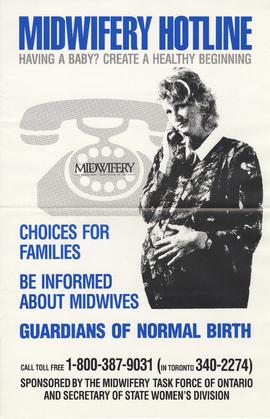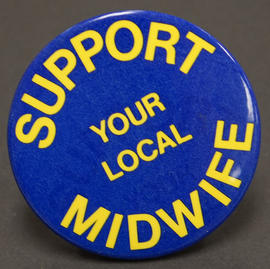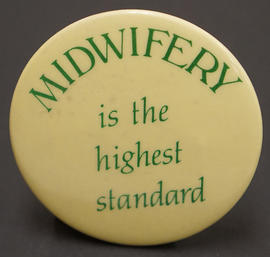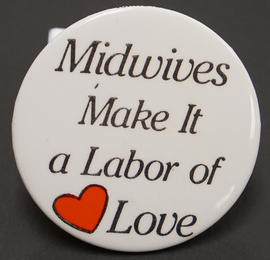Title and statement of responsibility area
Title proper
Midwifery Task Force of Ontario fonds
General material designation
- Graphic materials
- Objects
- Textual records
Parallel title
Other title information
Title statements of responsibility
Title notes
Level of description
Fonds
Reference code
CA ON0034 10-011
Edition area
Edition statement
Edition statement of responsibility
Class of material specific details area
Statement of scale (cartographic)
Statement of projection (cartographic)
Statement of coordinates (cartographic)
Statement of scale (architectural)
Issuing jurisdiction and denomination (philatelic)
Dates of creation area
Date(s)
-
1980-1996 (Creation)
- Creator
- Midwifery Task Force of Ontario
-
1957-2012 (Creation)
- Creator
- Kellerman, Maureen
Physical description area
Physical description
68.5 cm of textual records
3 buttons
1 photograph ; col. ; 9 x 13 cm
1 sticker
1 plastic card holder
3 buttons
1 photograph ; col. ; 9 x 13 cm
1 sticker
1 plastic card holder
Publisher's series area
Title proper of publisher's series
Parallel titles of publisher's series
Other title information of publisher's series
Statement of responsibility relating to publisher's series
Numbering within publisher's series
Note on publisher's series
Archival description area
Name of creator
(1983-1993)
Administrative history
In June 1983, a small group of midwives, consumers, health care providers and other supporters of midwifery met to discuss the status of midwifery in Ontario. Historically, Ontario had a tradition of lay midwives who attended the births of family, friends and neighbours. This tradition of community midwifery began to decline around the turn of the century until, by the 1950s, midwifery had all but disappeared in Ontario. In the 1970s, the practice of midwifery began to re-emerge and was influenced by the natural childbirth movement principles that pregnancy and birth are normal, healthy, family events and that pregnant women themselves should be the primary decision makers about the health care they receive.
Subsequently, the Midwifery Task Force of Ontario (MFT-O), a community-based lobby group, was established to promote legislation and recognition of midwifery. Around the same time, the association of practicing midwives (Ontario Association of Midwives) and nurse-midwives association (Ontario Nurse-Midwives Association) joined together to form the Association of Ontario Midwives (AOM). The MTF-O gained support from women and their families seeking an alternative to the medical model of childbirth and maternity care. Over the next several years, the AOM and the MTF-O worked together to advocate the creation of midwifery as a recognized profession. This culminated in Bill 56, the Midwifery Act which was passed on December 31, 1993 making Ontario the first province in Canada to recognize, regulate and fund midwifery as part of the health care system.
-
En juin 1983, un petit groupe de sage-femmes, et de fournisseurs de soins de santé et d'autres partisans de la profession de sage-femme se sont réunis pour discuter du statut de la profession de sage-femme en Ontario. Historiquement, l'Ontario avait une tradition de sage-femmes laïques qui assistaient aux naissances des membres de leur famille, de leurs amis et de leurs voisins. Cette tradition de sage-femme communautaire a commencé à décliner au tournant du siècle jusqu'à ce que, dans les années 1950, la profession de sage-femme ait pratiquement disparu en Ontario. Dans les années 1970, la pratique des sage-femmes a commencé à réapparaître, influencée par les principes du mouvement en faveur de l'accouchement naturel, selon lesquels la grossesse et l'accouchement sont des événements familiaux normaux et sains, et les femmes enceintes elles-mêmes devraient être les premières à décider des soins de santé qu'elles reçoivent.
Par la suite, le Midwifery Task Force of Ontario (MFT-O), un groupe de pression communautaire, a été créé pour promouvoir la législation et la reconnaissance de la profession de sage-femme. À peu près à la même époque, l'association des sage-femmes en exercice (Ontario Association of Midwives) et l'association des infirmières sage-femmes (Ontario Nurse-Midwives Association) se sont regroupées pour former l'Association des sage-femmes de l'Ontario (AOM). L'AOM a reçu le soutien de femmes et de leurs familles qui cherchaient une alternative au modèle médical d'accouchement et de soins de maternité. Au cours des années suivantes, l'AOM et la MTF-O ont travaillé ensemble pour promouvoir la création de la profession de sage-femme en tant que profession reconnue. Ces efforts ont abouti au projet de loi 56, la Loi sur les sages-femmes, qui a été adoptée le 31 décembre 1993, faisant de l'Ontario la première province canadienne à reconnaître, réglementer et financer la profession de sage-femme dans le cadre du système de soins de santé.
Subsequently, the Midwifery Task Force of Ontario (MFT-O), a community-based lobby group, was established to promote legislation and recognition of midwifery. Around the same time, the association of practicing midwives (Ontario Association of Midwives) and nurse-midwives association (Ontario Nurse-Midwives Association) joined together to form the Association of Ontario Midwives (AOM). The MTF-O gained support from women and their families seeking an alternative to the medical model of childbirth and maternity care. Over the next several years, the AOM and the MTF-O worked together to advocate the creation of midwifery as a recognized profession. This culminated in Bill 56, the Midwifery Act which was passed on December 31, 1993 making Ontario the first province in Canada to recognize, regulate and fund midwifery as part of the health care system.
-
En juin 1983, un petit groupe de sage-femmes, et de fournisseurs de soins de santé et d'autres partisans de la profession de sage-femme se sont réunis pour discuter du statut de la profession de sage-femme en Ontario. Historiquement, l'Ontario avait une tradition de sage-femmes laïques qui assistaient aux naissances des membres de leur famille, de leurs amis et de leurs voisins. Cette tradition de sage-femme communautaire a commencé à décliner au tournant du siècle jusqu'à ce que, dans les années 1950, la profession de sage-femme ait pratiquement disparu en Ontario. Dans les années 1970, la pratique des sage-femmes a commencé à réapparaître, influencée par les principes du mouvement en faveur de l'accouchement naturel, selon lesquels la grossesse et l'accouchement sont des événements familiaux normaux et sains, et les femmes enceintes elles-mêmes devraient être les premières à décider des soins de santé qu'elles reçoivent.
Par la suite, le Midwifery Task Force of Ontario (MFT-O), un groupe de pression communautaire, a été créé pour promouvoir la législation et la reconnaissance de la profession de sage-femme. À peu près à la même époque, l'association des sage-femmes en exercice (Ontario Association of Midwives) et l'association des infirmières sage-femmes (Ontario Nurse-Midwives Association) se sont regroupées pour former l'Association des sage-femmes de l'Ontario (AOM). L'AOM a reçu le soutien de femmes et de leurs familles qui cherchaient une alternative au modèle médical d'accouchement et de soins de maternité. Au cours des années suivantes, l'AOM et la MTF-O ont travaillé ensemble pour promouvoir la création de la profession de sage-femme en tant que profession reconnue. Ces efforts ont abouti au projet de loi 56, la Loi sur les sages-femmes, qui a été adoptée le 31 décembre 1993, faisant de l'Ontario la première province canadienne à reconnaître, réglementer et financer la profession de sage-femme dans le cadre du système de soins de santé.
Name of creator
(1957-2012)
Biographical history
Maureen Elizabeth Kellerman completed a BA in Canadian Studies at Carleton University and devoted her life to supporting young families at the local and national levels. She worked for Canadian Association of Family Resource Centres, and Canadian/Military Family Resource Centres. Educator, activist, and leader, Maureen founded Mothers Are Women (MAW) in 1984, and was a key organizer for the legalization of midwifery in Ontario during the 1990s.
-
Maureen Elizabeth Kellerman a obtenu une licence en études canadiennes à l'université de Carleton et a consacré sa vie à soutenir les jeunes familles aux niveaux local et national. Elle a travaillé pour l'Association canadienne des centres de ressources familiales et pour les centres de ressources familiales canadiens et militaires. Éducatrice, activiste et leader, Maureen a fondé Mothers Are Women (MAW) en 1984 et a été l'une des principales organisatrices de la légalisation de la profession de sage-femme en Ontario dans les années 1990.
-
Maureen Elizabeth Kellerman a obtenu une licence en études canadiennes à l'université de Carleton et a consacré sa vie à soutenir les jeunes familles aux niveaux local et national. Elle a travaillé pour l'Association canadienne des centres de ressources familiales et pour les centres de ressources familiales canadiens et militaires. Éducatrice, activiste et leader, Maureen a fondé Mothers Are Women (MAW) en 1984 et a été l'une des principales organisatrices de la légalisation de la profession de sage-femme en Ontario dans les années 1990.
Custodial history
The records were donated by Maureen Kellerman to University of Ottawa Archives and Special Collections in 2006 and 2010.
Scope and content
The fonds consists of administrative records for the Midwifery Task Force of Ontario including minutes, member’s lists, newsletters and correspondence. It also contains, legal briefs, lobbying strategies, and testimony in support of midwifery. Newspaper clippings and reports on midwifery and childbirth in Canada and internationally are also included.
-
Le fonds comprend des documents administratifs du Midwifery Task Force of Ontario, notamment des procès-verbaux, des listes de membres, des bulletins d'information et de la correspondance. Il contient également des mémoires juridiques, des stratégies de lobbying et des témoignages en faveur de la profession de sage-femme. Des coupures de presse et des rapports sur la profession de sage-femme et l'accouchement au Canada et à l'étranger sont également inclus.
-
Le fonds comprend des documents administratifs du Midwifery Task Force of Ontario, notamment des procès-verbaux, des listes de membres, des bulletins d'information et de la correspondance. Il contient également des mémoires juridiques, des stratégies de lobbying et des témoignages en faveur de la profession de sage-femme. Des coupures de presse et des rapports sur la profession de sage-femme et l'accouchement au Canada et à l'étranger sont également inclus.
Notes area
Physical condition
Immediate source of acquisition
Arrangement
The fonds is arranged according to the following nine series; Administration, Midwifery Groups/Individuals, Midwifery and Homebirth Care, Conferences, Lobbying, Health Professions Legislative Review (HPLR), Task Force on the Implementation of Midwifery, Legal Cases, and Ephemera.
Language of material
- English
- French
Script of material
- Latin
Location of originals
Availability of other formats
Restrictions on access
The majority of the fonds is open and accessible, however, some files are restricted for a predetermined period of time. Please ask ARCS staff for further information.
Terms governing use, reproduction, and publication
Finding aids
Associated materials
Accruals
Alternative identifier(s)
Standard number
Standard number
Access points
Subject access points
Place access points
Name access points
Genre access points
Control area
Description record identifier
CA
Institution identifier
ON0034
Rules or conventions
RAD
Status
Final
Level of detail
Full
Dates of creation, revision and deletion
Language of description
- English




